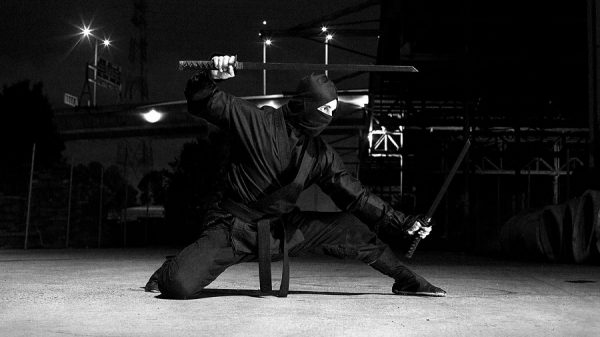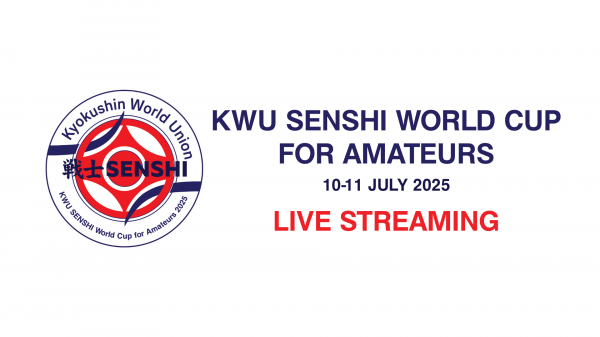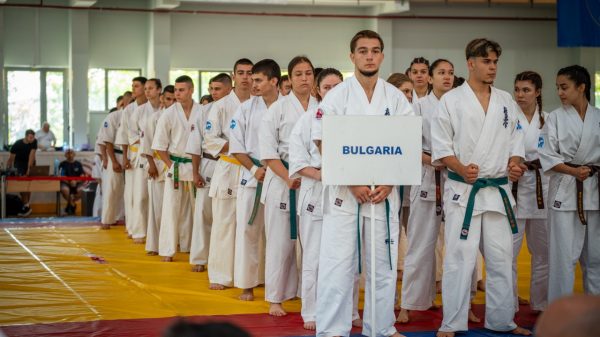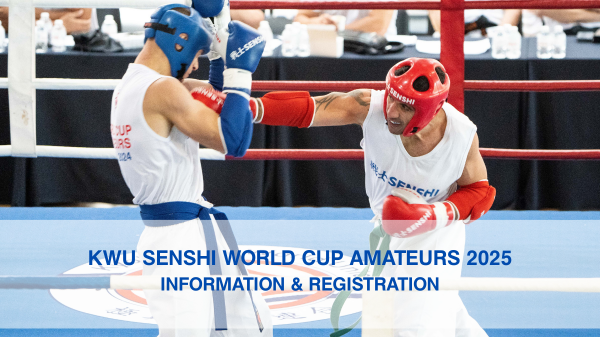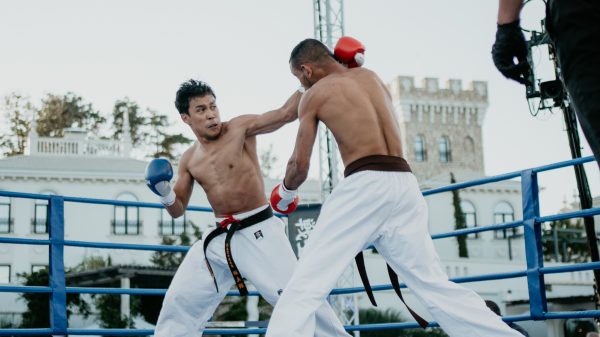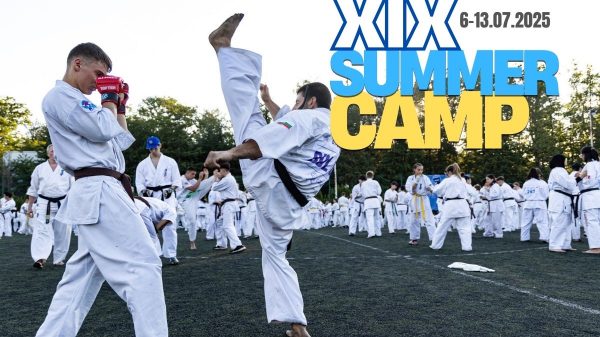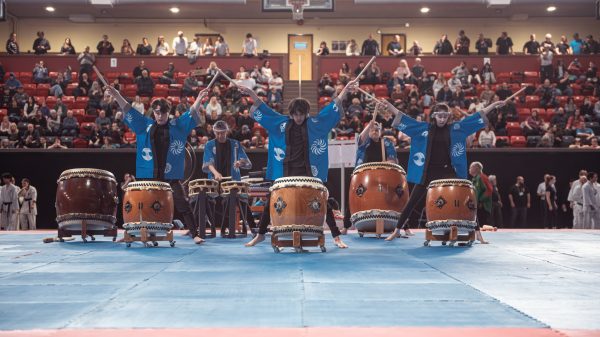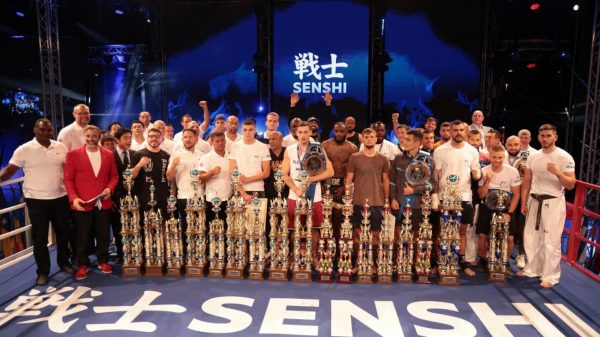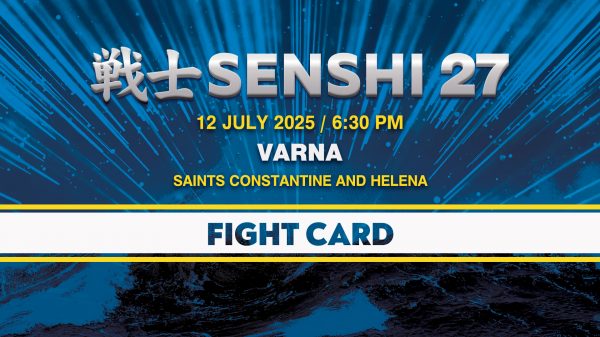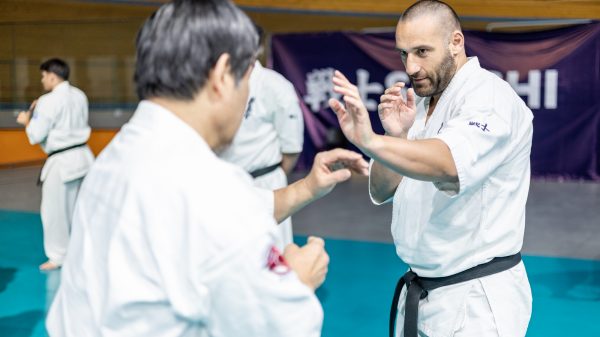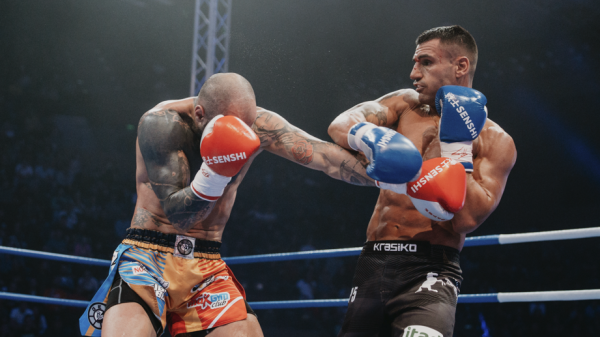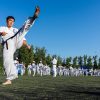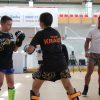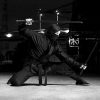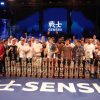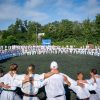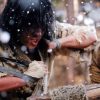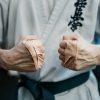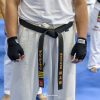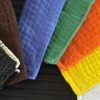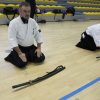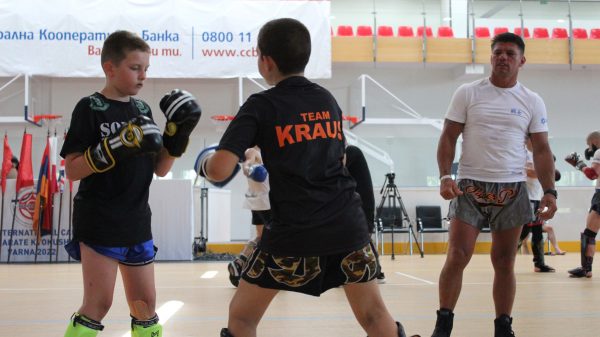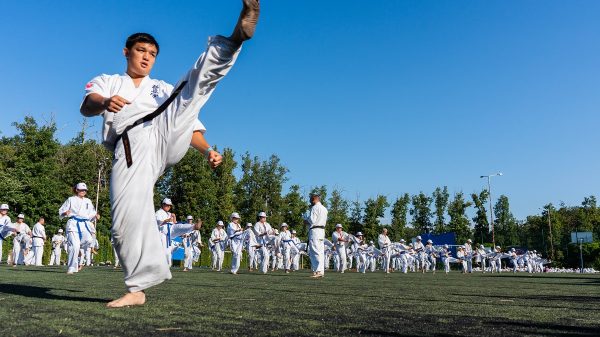Story by Radu Diaconu
A Karateka Searches for The Secrets of Success in the Ring
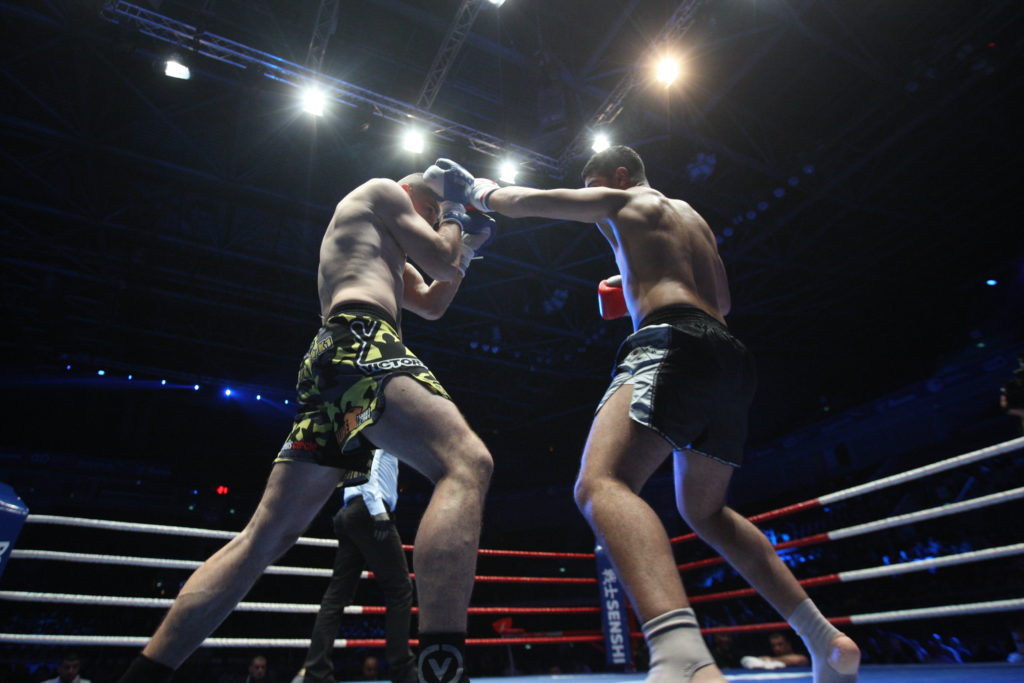
My first steps into the ring make me feel like I weigh a ton. The floor sinks slightly under my feet, sending signals to my brain that are amplified by a hundred voices screaming my name.
It was a surreal feeling, to say the least. From the months of preparation to the last minutes in the locker room, I’d rehearsed for an event for which nothing could prepare me.
The tension rose, the ring judge moved forward, the crowd went quiet and the bell rang — and suddenly all I could hear was my breathing magnified by the beating of my heart.
I looked into my opponent’s eyes and smelled the rage inside him. The smells were from the secretions the body produces when it senses danger. His pupils were dilated like those of a bull about to charge, a beast that was waiting for his victim to make just the right move before goring him to death.
And then the first punch hit my body, reverberating through my organs. The pain was incredible, but like a cork that blows to release the pressure in a bottle, my senses come back the same way they left, and I became whole again.
I emerged from the daze and heard a smack — a palm hitting the floor in my corner of the ring. It was followed by the familiar voice of my coach George: “Move! Move! Don’t stay there!”
Round 1
I feel the punch and tell myself: “That’s it? That’s all there is? Go!” I circle and kick him in the leg. Seeing him cringe, I allow myself a moment to reflect.
The mental part of a fight is the key component every martial artist strives to overcome. Randy Couture, former UFC heavyweight, and light-heavyweight champ said in a 2003 Black Belt interview, “A fight is 90-percent mental and 10-percent physical, yet most fighters train 90-percent physical and 10-percent mental.”
This has always been my downfall, and every fight I’ve had has shown me that the fear — the “jitters,” as they call it — never really goes away. The big question is why.
“It’s the nature of our minds [because] we have the ability to think ahead,” said Dr. Peter Bender, a sports psychologist who works with fighters, most prominently Georges St-Pierre. “People start catastrophizing, and a multiplying effect ensues where negative thoughts take over the mind.”
I asked him why fighters start to doubt themselves when they train so much and are in their best physical shape. “Angst is emotional,” said Bender, who also has coached the Canadian national judo team. “The worry, the anxiety, the pressure, letting people down — it’s an emotional thing.”
Bender said he strives to move his clients away from those thoughts and toward positive thinking: “When you prepare for a fight, focus on the things that you can control. You can’t control the referee or the judges, so why waste your time on them? Don’t worry about things your opponent does. Focus on your fight, focus on targeting your spots, avoid dark thoughts and, most importantly, fight to win, not to lose.”
Round 2
I move across the ring, trying to catch my breath. Hitting, getting hit, moving away, moving forward — the stress rises to new heights.
Sometimes I still feel the palpitations at night, thinking of my most recent fight, planning every move and rehearsing every combination. In the dreams, everything is perfect — until reality wakes me like a bad nightmare.
“You also have to imagine yourself losing,” said George Ohan, a fourth-degree karate black belt and my coach. “You have to know what it feels like to be stuck in the corner, to be chased by your opponent in a volley of kicks and punches. If you have never imagined such a situation, you will start panicking and your game will be thrown off.”
Part Egyptian and part Italian, Ohan was tall, broad and muscular, a perfect mix of raw power and finesse — which is a thing of beauty for someone who’s practiced a martial art for more than 30 years. I told him that I was nervous about my upcoming fight, that I was having difficulty relaxing.
“It’s normal,” he said. “I am like that, too, but you have to learn to use that to your advantage. That’s the key to winning or losing.”
He made it sound like it was just another round of sparring, but he knew it was different. In 1999 he fought in Japan at the World Karate Tournament. His brother Dominic, three years his junior, coached him, often calming him down and soothing his nerves. George was forced to face his demons while they were eating him inside. Meanwhile, his brain was turning to mush and his body was ready to quit as he waited for a Japanese official to call his name.
It’s all about bushido, the way of the warrior, George said. Everything up to that point belongs to you, but in that instant when your name is called, you must be ready to demonstrate that you have what it takes, that you’ve mastered your body and soul.
Round 3
I hit him in the liver, he falters, backs away, and starts to circle. My confidence is growing, but my body is badly bruised.
From a different perspective, I turned my attention to a junior fighter named Marc Mantilla, an old friend from college. Tattoos covered his body from his calves to his neck. He decorated himself the way other fighters collect trophies. The pain he endured on the road to all those victories must have anesthetized him to getting punched and kicked, I thought. Wrong.
“I remember my first bout,” Mantilla said. “I remember puking a few minutes before the fight while my coach tried to push me out as they were calling my name.”
I asked if he thinks he could do this for a living, in front of thousands of fans waiting for someone to get the daylights knocked out of him. “You crazy?” he blurted. “Who in their right mind would want to go through that every three or four months?”
I remembered a 2011 study done by the journal Psychology of Sport and Exercise on the impact of anger in karate athletes. Anger, when used to your advantage, can increase energy and help overcome anxiety, the study found. However, too much anger can lead to the opposite reaction: a decrease in energy and an increase in anxiety.
I recalled Mike Tyson biting the ear of Evander Holyfield in their 1997 boxing match. Too much anger does lead to fear — the fear of losing.
“I think I would do it, Marc, “I said in response to his rhetorical question. “I mean, I hate it — like Nick Diaz always said, you have to hate fighting in order to love it. It’s a love-hate relationship.”
“When your mind is ready to comprehend this dichotomy, then maybe you can be Nick Diaz,” Mantilla said. “But until you learn to live like those guys, always in survival mode, always hungry and waiting for the next adversary, I don’t see you doing it.”
Thanks a lot, Marc. I was back to square one.
Round 4
Almost done, I tell myself. I can taste blood in my mouth, and my throat is aching from the punches to my sternum. He gives me a high kick, and I counter with a low one, followed by shots to the ribs.
I made my way to one of the oldest boxing organizations in Montreal, Club de Boxe Champion. There, I met George Cherry, owner, manager, and former fighter. Cherry was a short 72-year-old burly man with white hair and a round face. He was wearing a black long-sleeve shirt, jeans, and small black shoes. If you’ve seen Mickey Goldmill, cinematic coach of Rocky Balboa, you can imagine George Cherry.
His gym was decorated with pictures of prizefighters like George Foreman, Joe Frazier, and Muhammad Ali, as well as promoter Don King. Cherry also had on display a concise motto: “If you want, you can!”
I asked how he used to prepare his athletes for a bout. “We have a game plan for every fighter, and we change it accordingly once the fight is underway,” he said.
When what I assume was a puzzled look appeared on my face, he continued: “What I mean is that if the fight is not going according to plan — we never tell the fighter that — we simply change the tactics and focus on his strong skills to help him win.”
That does not always happen, of course, but Cherry seemed unmoved by such things as stress and nerves.
“Listen, son,” he continued. “When a fighter signs a contract, he is under obligation to go. Every fighter gets nervous — that is normal — but come fight time, there is no backing away. You are going to war.”
He couldn’t have said it better. The call of war, the moment of truth. This reminded me of an old proverb by the Greek sophist Epictetus: “First, say to yourself what you would be, and then do what you have to do. There is no backing away from who we truly are.”
Round 5
Tired, so tired. I try to move, but my legs are badly bruised. Lifting them is like trying to lift a concrete column. My coach is screaming, yet I hear only silence.
Desperately wanting to understand why we fear, why we doubt and how we overcome, I sought out Joe Bell, a sports psychologist and one of the few mental-performance coaches in the world who specialize in combat-sports psychology. He works directly with UFC fighters to enhance their mental capabilities. In an email exchange, I asked about fear.
“Fear is something that all fighters experience — no one is exempt,” he wrote. “It is something that will always exist. Fear is designed to keep us alive, and we cannot deny millions of years of instinct.”
When reading what he wrote next, I cringed: “Doubting, I believe, is more dangerous than being fearful. In my opinion as a fighter and psychologist, no man or woman should step into the arena of combat if they doubt themselves. It leads to second-guessing, hesitation, and muscle tension, which can hamper optimal performance by 60 percent. More often than not, [it] only ends in tears and, in the worst cases, leads to unnecessary injury and [is] possibly career-ending.”
The veil was lifted, and the answer was in front of me: Fear but never doubt. Doubt is the evil of the mind. Doubt impedes us from achieving our potential. Doubt is a disease we must purge — only then can we become true warriors.
“You focus on what you will do, not what your opponent can do,” said Sandro Ferrante, my old training partner, and a multi-time karate champion. “Focus on you, believe in yourself, be supremely confident by saying you are unique, you are a warrior with a mission. It is 15 minutes of your life — in a lifetime, it is nothing. That’s what makes you great.”
It dawns on me like a lightning bolt, and I move in for the kill. I don’t doubt, I have no fear, I am confident. I set up a combination: punch, low kick, high kick, and shoot for the ribs. Like a tree whose leaves have fallen, my opponent is brittle. The referee moves forward. I bow to the judges, and my hand is lifted. The feeling is incredible. Elation.
All the months of training had coalesced in 15 minutes of my life. My mind was on track. I had overcome my fear, and I believed in myself. Anger, anguish, pain, suffering — all faded on the way to that moment.
I turned back to my corner and looked at my coach and team. My eyes fell on Kevin Bui, a longtime friend, and karate champ. That’s when I vividly remembered something he’d said: “As a fighter, I think fear should not be part of you — only nerves and stress. If you are scared, you are doing the wrong sport.”
Apparently, I still had much to learn.


